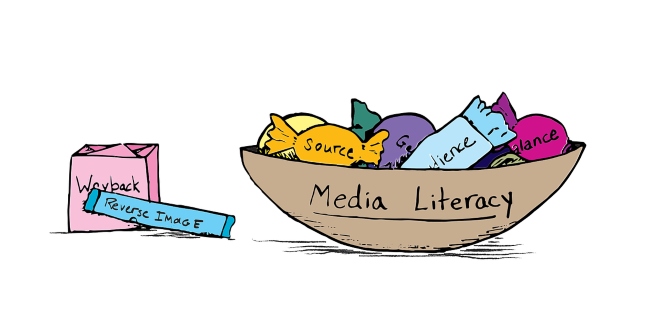 I was recently asked to respond to a presentation on Australian children’s news media literacy at LSE. Shortly after, I participated in a roundtable on news literacy and disinformation, organised by the Department for Digital, Culture, Media & Sport (DCMS). These two occasions have made me think more deeply about news literacy as a variant of media literacy, which has the potential to enable citizens to participate actively in society. The ability to evaluate media content like the news is central to notions of media literacy. Such an ability is sine qua non for a well-informed citizenry. But as we think about the importance of promoting media literacy among children and adults, different challenges arise, which require different solutions.
I was recently asked to respond to a presentation on Australian children’s news media literacy at LSE. Shortly after, I participated in a roundtable on news literacy and disinformation, organised by the Department for Digital, Culture, Media & Sport (DCMS). These two occasions have made me think more deeply about news literacy as a variant of media literacy, which has the potential to enable citizens to participate actively in society. The ability to evaluate media content like the news is central to notions of media literacy. Such an ability is sine qua non for a well-informed citizenry. But as we think about the importance of promoting media literacy among children and adults, different challenges arise, which require different solutions.
The UK Government’s white paper on online harms proposes to empower users with the skills and knowledge they need to navigate the digital environment safely and critically, building resilience against the limitations of such an environment, from cyberbullying to misinformation. When we refer to the skills and knowledge that users need, we often talk about media literacy and, in particular another variant, digital literacy. But what these skills and knowledge should be is not always clear. Arguably, besides including functional skills and knowledge about how traditional and digital media work, media literacy is about being able to evaluate media content as well as understanding the broader media ecosystem. But what we mean by promoting media literacy is somehow enigmatic. How should we promote it? And should we promote it in the same way to reach children and adults?
In line with the white paper, DCMS is now working on gathering evidence through a mapping exercise and literature review to develop a media literacy strategy. But while promoting media literacy means that we need to create formal and informal learning opportunities that can reach both children and adults, it is unclear why the Department for Education (DfE) has not been fully participating in the deliberative process about media literacy, with no or few representatives joining the conversation. With this in mind, here are some of the challenges that we face in promoting children’s and adults’ media literacy.
Children
Children are easily reachable in school, which is the best place to teach them media literacy. But we still face two major challenges:
The school curriculum
While initiatives like NewsWise have done a great job of promoting news literacy across different schools in the UK, we cannot just rely on such initiatives. It is unclear whether media literacy is taught via the current school curriculum, and whether it should be taught as subject-specific or across the curriculum. It seems fair to expect that several subjects have something to offer, including English, citizenship and computing, among others. But these subjects either do not focus sufficiently on evaluating information, or do not teach children about the broader media ecosystem and how information circulates in the digital age.
Is it the same in other countries? Interestingly, there is a subject on the Australian national curriculum that has the potential to promote media literacy, which is media arts. This subject, though, focuses on production skills but not on critical media analysis. Like media arts in Australia, we have a subject that has a similar potential in the UK, which is media studies. Unlike media arts, media studies focuses on critical media analysis. But while media arts is compulsory in Australia, media studies is optional and taken by very few students in the UK, which makes a cross-curricular approach to media literacy more likely to work in this country.
Educators
Teachers need teaching resources. But those available are often about traditional rather than digital media. And while teachers undergo training, they are not taught media literacy, nor how to teach it across the school curriculum in ways that are relevant to their subjects. Teachers, furthermore, are not the only educators we should rely on. School librarians should also play a role. But their potential as educators is under-realised and under-supported. And it is not mandatory for schools in England to have a library.
Adults
Most adults are not in any type of education, which makes informal learning essential for them to become media literate. And by the same token, it makes it hard to reach them, which leads to two significant challenges that we face:
Libraries
Public libraries are spaces where citizens can access quality information under the guidance of librarians. While the internet provides users with opportunities for accessing a wider range of information that is unmediated by traditional media and public institutions, this does not mean that we live in an age in which libraries should be redundant. But libraries are in decline in the UK. They suffer from decreasing staffing and budgets. And thousands are not used.
Raising awareness
Civil society organisations like Internet Matters do a great job of raising awareness about the internet, providing resources to parents about internet safety. Media activism has the potential to reach different populations through campaigning about the media. Ireland offers an example of how campaigning can be conducted on a large scale to promote adults’ media literacy. But we cannot rely on the efforts of relatively small organisations in the UK that campaign about the media. The UK Government has recently launched a toolkit to help public servants to identify misinformation. But this initiative is not broad enough to reach different populations. And more should be done to raise awareness among the public, besides launching a checklist that encourages users to be careful on social media.
Recommendations
Promoting media literacy does not mean that the media industry can become lax about producing quality information. Nor that online platforms should not be redesigned and possibly regulated to tackle online harms like misinformation. But as media literacy is essential for participating actively in society, we need to promote it among children and adults, which requires different actions. In short:
- Media literacy needs to be firmly embedded within the school curriculum.
- Educators should be supported with training and resources.
- Librarians should be recognised and supported as educators.
- Public libraries need funding.
- Media activism should be incentivised.
- We need government-funded media literacy campaigns.
♣♣♣
Notes:
- This blog post appeared first on LSE Media Policy Project.
- The post gives the views of its author(s), not the position of LSE Business Review or the London School of Economics.
- Featured image by tiday, under a Pixabay licence
- When you comment, you’re agreeing to our Comment Policy
 Gianfranco Polizzi is a PhD researcher at LSE’s department of media and communications. His academic interests range from media literacy, citizenship and education to political communication and democratic theory. His interest in media literacy encompasses not only a focus on education and the learning of how to be literate in the digital age, but also a focus on the civic, political opportunities that critical digital literacy entails for citizens of all ages.
Gianfranco Polizzi is a PhD researcher at LSE’s department of media and communications. His academic interests range from media literacy, citizenship and education to political communication and democratic theory. His interest in media literacy encompasses not only a focus on education and the learning of how to be literate in the digital age, but also a focus on the civic, political opportunities that critical digital literacy entails for citizens of all ages.





